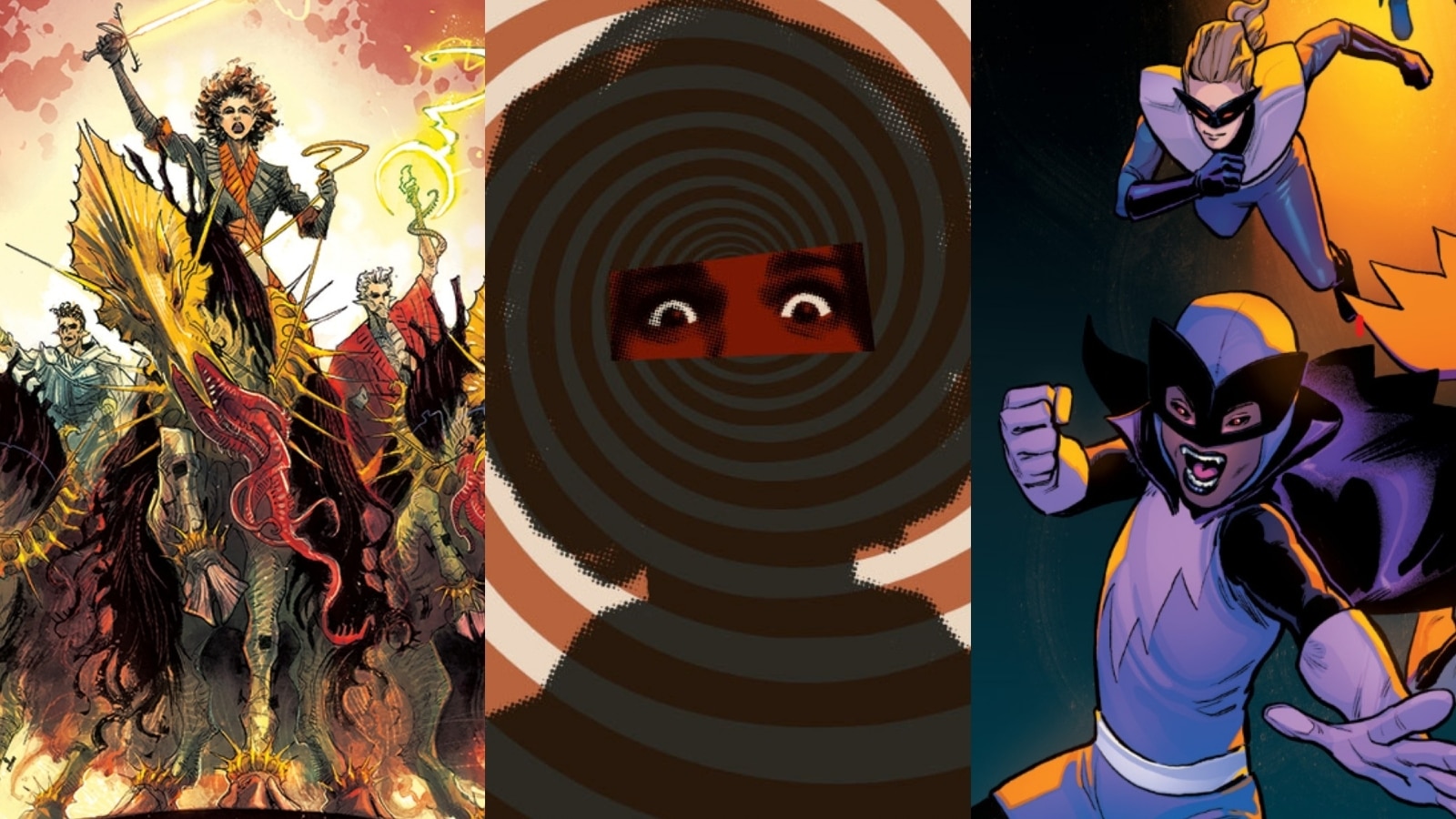When Comixology launched in 2007, digital comics were still considered the devil’s brew to most comics publishers – and certainly retailers, who feared that digital would kill print comics, the way it was drowning out everything else.
The comiXology hompage, circa August 2007. pic.twitter.com/nausKjITQU
— Chris Arrant (@chrisarrant) January 19, 2023
It turned out that digital was additive and people liked paper – and though Comixology was viewed with suspicion for years, quietly and patiently, they became a respected member of the comics community, and a solid sales platform.
So it is that last week’s near total layoffs of employees and seeming sinking of the brand as an independent entity within Amazon was met with sadness by the online comics community. It was sadness not just for the end of a dedicated sales platform, but for the many people who worked at Comixology who were seen as valued colleagues.
Controversies aside, (we’ll get to that), Comixology added a lot to the comics community – co-founder David Steinberger and head of content Chip Mosher, who became for many the public face of the company, weren’t just techheads. Comixology offered a lot of services that benefitted the most indie of creators, including Comixology Submit, a long running program that allowed creators to get their comics on the platform. (Submit was launched and run by co-founder John Roberts, I’m told.) And Comixology Originals, although also controversial, really was a creator owned platform that paid good page rates – something virtually unheard of.
Comixology’s sponsorship of indie comics festivals, including SPX and Thought Bubble, eventually rubbed some people the wrong way. I’m not going to disrespect people who want to take an ethical stand, but bouncing Comixology buying food and drinks for SPXers because Amazon Web Services hosts a (admittedly alarming) facial recognition technology is a pretty far reach for offense. AWS hosts about a third of the web, including everything from Slack to Netflix. Comixology withdrew from sponsoring SPX but continued to sponsor Thought Bubble, and other things like Artist Alley at NYCC, the Eisners Awards and more. Those sponsorships are most likely gone, and that’s unfortunate.
I’m not saying Amazon isn’t one of our tech overlords – but Comixology tended to try to be helpful within the community.
So a lot of stuff was tweeted that week about the company. A sampling:
Gail Simone: Every person I ever met who worked for @comixology cared deeply about making comics available to everyone.
They were always smiling at whatever cool thing was coming next.
I hope they get to take that enthusiasm and talent somewhere that will appreciate them as they deserve.
To those former @comixology employees, we saw what you were doing and it was appreciated, even if we didn’t take enough time to say so properly Thank you for your care and curation and archiving a million comics so I could do the research to write lots more comics!
Asher Elbein: Something about Comixology’s destruction I keep thinking about: it worked pretty well when Amazon bought it. They could have left it alone and simply collected rent off the thing for years. Instead they broke it.
Benjamin A. Wilgus: Comixology was a rare stable paycheck in comics, staffed by incredible people who were great at their jobs, and enabled many cartoonists to get their foot in the door. A lot of us had been holding our breath since Amazon acquired CMX, and I hate that we were right to worry.
Eric Palicki: I’ve been thinking a lot about @comiXology and my heart goes out to anyone affected by the layoffs. I don’t know if I’d have gotten anywhere in comics, certainly not as far along as I am, without the #Submit program and the support of folks like @chipmosher and @johnnystorm0.
Jamal Igle: My heart goes out to all of my colleagues at Comixology who were laid off. I don’t know what the future looks like but hopefully you’ll all land on your feet.
John Allison: So sorry to hear about the huge Comixology layoffs. If not for Comixology, I don’t think Giant Days would have survived in single issues. I don’t know that it would have survived at all. I know many other creators who would say the same about their series. Comixology was a digital comics service that worked – for the big publishers, for self publishers. It wasn’t perfect – nothing is – but what Amazon has done is corporate cultural vandalism. Incredibly depressing. If you worked there, thank you for helping me keep the lights on.
Brian Clevinger: We were with ComiXology since before day 1. The very first file they ever uploaded was an issue of Atomic Robo. And it’s been agony watching Amazon kill them with slow motion corporate malfeasance. Today’s news was inevitable, but it didn’t have to be.
Which promoted co-founder John Roberts to tweet: Product ID #1 in the Comixology database was Atomic Robo #1 way back in 2009
The absorption of Comixology also led to some thoughtful responses about the future of digital comics and comics in general. A sampling. (Tweet threads have been condensed but you can read the originals in links.)
Responding not just to CMX but Brian Hibbs’s essay on the state of the periodical, Deb Aoki wrote:
Fwiw, i think the webtoon format is the future of serialized comics in N. America, even more so now that comixology just had a round of layoffs this week. It’s just a matter if the US comix pubs will realize it, or will continue to dismiss it as something just for “other people”
And by “other people” i mean younger and/or female readers who have flocked to webtoons because they’re giving them content that they crave but aren’t getting enough from comics or manga publishers… a demographic that’s often dismissed by US periodical comics publishers
But think about it: how many of you go to a comic shop weekly or monthly to buy a stack of “floppy” comics? How many of you “wait for the trades” instead? Manga publishers gave up on “floppy” comics decades ago in favor of a format that can be sold in bookstores or to libraries
Why am i a proponent of online / Webtoon serialization? Because the current model of g. novel publication, where fans wait months or years for the next volume of their fave series = out of sight, out of mind for fans. Weekly or biweekly webtoon serialization keeps them engaged.
Weekly or biweekly webtoon/webcomic serialization also = a channel for creators to get paid weekly AND get regular feedback from readers. It’s cheaper and more convenient to buy by the chapter vs $4-6 for a 30 page printed comic book. It’s easier to recommend to others too.
Responding to Ritesh Babu’s observation that indie digital service Panel Syndicate is a key player, and director Duncan Jones humorously suggesting they start a company, digital comics pioneer Alex deCampi surveyed the whole scene (quoted with permission):
There’s part of me that yells “if I could find investors, TOMORROW” but also there’s a part of me that goes “actually the comics market is in a massive transition right now and it’s not that simple.”Here’s more than you ever wanted to know about the subject:
The death of Comixology only inconveniences the monthly comic audience, which is ageing / slowly dying out anyway. The kids read Shonen Jump (on its own app) Webtoons / Tapas, or graphic novels. (1/?)
Getting into monthly comics in any form right now is a fool’s game. Saying that, building an app that can host trad monthly comics with an AI/ML to do Guided View automatically? Not hard. Way easier than when Comixology was founded.
You also can’t make money with digital-first monthlies. Look at Scott Snyder [complaining] about how little his CXO books sold. And Substack’s likely lost a BUNDLE on its deals with comics folks. Prob only Morrison & Hickman (I’ve seen twitter ads for 3w3m, lol) are sustainable
So, back to print? Hmm. There are also a ton of little indie publishers right now backed by film/TV/venture capital money whose main remit is to collect IP for Hollywood, and whose print comics don’t make money. That is a great way to turn a big investment into a small one.
Where do you go? There is definitely a gap in the market for good, adult genre graphic novels and still room in YA, I think, but the only attractive option there is pairing with a Big 5 publisher so you can offer good, proper creator-owned deals…
…and just accepting a non guided view digital reading experience, OR also putting the book out on Webtoons or Tapas which essentially involves re-lettering it/lots of time and effort (I’ve done that, with REVERSAL).
But also: the Webtoons reading experience is really good! And most of Team Mainstream Comics won’t go there because it’s a little bit too girly and queer for them to handle
All this is a really long-winded way of saying that I don’t think we will see another Comixology, nor is recreating it a smart use of investor money (unless you can automate nearly all of it with AI which tbh at this point you probably can)
Jonah Weiland, who founded CBR way back in the mists of the 90s, and ran a very successful webhosting company, had his own thoughts:
Reading stories about layoffs at Amazon today. My heart goes out to all affected. Terrible news.
Amongst those affected are a number of folks at @comiXology and I can’t stop thinking about how poorly it’s been managed by Amazon this last year. They’ve destroyed the platform.
ComiXology has historically not been terrific, even before the Amazon acquisition, but it worked. It was dependable and relatively easy to use.
Digital sales numbers were never great. Moments of success, but for the most part they were minimal. Average of 10% print sales.
Not great numbers, but they were a fairly reliable additional revenue stream for publishers. Something they could count on.
Since the relaunch integrating CX in to the Amazon architecture, it’s been a disaster for most comics publishers. For many, digital sales halved. Or worse.
There have been improvements in the app and purchasing since relaunch, but I know many folks who gave up when it became too hard to buy comics easily. This may be anecdotal, but dwindling sales back it up.
How is it 2023 and American comics still don’t have a reliable platform?
DC & Marvel having their own digital platforms shields them only somewhat. CX contracts with publishers demand an exclusivity window. Thankfully those windows have shortened, but frankly too late and at this point any publishing window restrictions should be rejected outright.
It’s worse for every American pub who’s not DC/Marvel. Most don’t have the capital to build their own platform, or a large enough audience to support it. For some, that 10% additional revenue from digital sales meant everything. It meant survival.
This is in no way to say digital comics are dead. They’re not. There are many non traditional digital comics publishers who are doing quite well. Building communities. Innovating. Using formats that aren’t copy and pasting a typical comics page to be read on your phone.
I worked in comics & entertainment for a total of 22 years, with a strong focus on technology. The fact the comics industry continues to be filled with poor tech and run by luddites who can’t see the future disturbs me greatly. This work isn’t easy, but boy do some make it hard.
It’s my sincere hope someone comes along in the American market and upends comics and digital publishing. There is opportunity. It likely won’t come from me. I served my time in comics, it preyed on my soul. I’m not interested in it taking any more from me.
And one more from co-founder Roberts:
https://twitter.com/johnnystorm0/status/1615764082006843392
As I mentioned to many people last week, in theory adding digital comics to the greatest shopping platform ever known to humankind is not a bad thing for visibility, discoverability and convenience. But comics folks like comics things. We liked having our own bespoke platform with the information we liked to find, and Amazon has taken all of that away with a far less usable interface, and now no one is left to fix it.
Is that just being fussy or a real drawback? Whether digital comics sales have decreased measurably since being absorbed into Amazon is still an open question – but a huge one. A report on Sktchd that I can’t find the link to said publishers kind of shrugged when asked last year, and my own inquiries have received ambiguous answers, but the general idea expressed to me has been “not really.” Weiland above suggests that sales have fallen, creators have told me their digital royalties have fallen, and others have reported a drop, so let’s just say the jury is out on that one.
Looking back on all of this, though, it does seem an era has come to an end. As others have noted, the American dream for an entrepreneur these days is to build a start-up, sell it to a giant corporation and watch them tear down everything you put into it. Wash. Rinse. Repeat. When Comixology was a start-up begun by Steinberger, Roberts and Peter Jaffe, the dream was to be acquired by one of the tech giants. And that happened. Other tech comics start-ups (Madefire) didn’t make it. It’s hard to imagine that any of the new digital comics companies will someday be acquired by Apple but….you never know. The killer app, platform or content may come along that makes digital comics a new frontier again.
But for now, the comics community has lost a valued member.









I think the big publishers are mostly indifferent, since best reporting has ever suggested a 15 percent readership on digital. And they have never invested time or money into making good comics native to digital platforms. That said, once they did their Unlimited services, there was no appetite for improving the format. Since the rejection of Google’s payment terms, Comixology has been completely worthless for discovering or reading new comics on my Android phone. I still can’t come up with a good for for how to add a comic to a list and then log in to the website and buy the right comics. It adds 10 more steps along the way for me to rethink whether I really wanted to spend money on a digital comic. Collectively, the whole situation is like if Diamond Comics had made an agreement to only distribute comics at Walmart or Kmart in the heyday of the 80s or 90s. The publishers turned their proprietary digital comics over to a single retailer, and everyone else has been trying to figure out how to be profitable in a single retail model.
Weird how this has literally zero critical analysis, like the company just somehow magically got controlled by Amazon without anyone being involved. Maybe if there were actual journalists thinking about how things happen instead of just regurgitating quotes, these buyouts would become less common, since founders would know they would inevitably get slammed as soon as they took the money from whatever even bigger company would eventually run their service/product into the ground.
David Steinberger et al. are absolutely (some of) the bad guys here, just like everybody else already massively financially successful who screws over the employees and customers who made them that way in order to gather even more obscene wealth.
Sad.
This has to be the laziest written online article I’ve read in at least five years. It reads like a subreddit post.
Comments are closed.